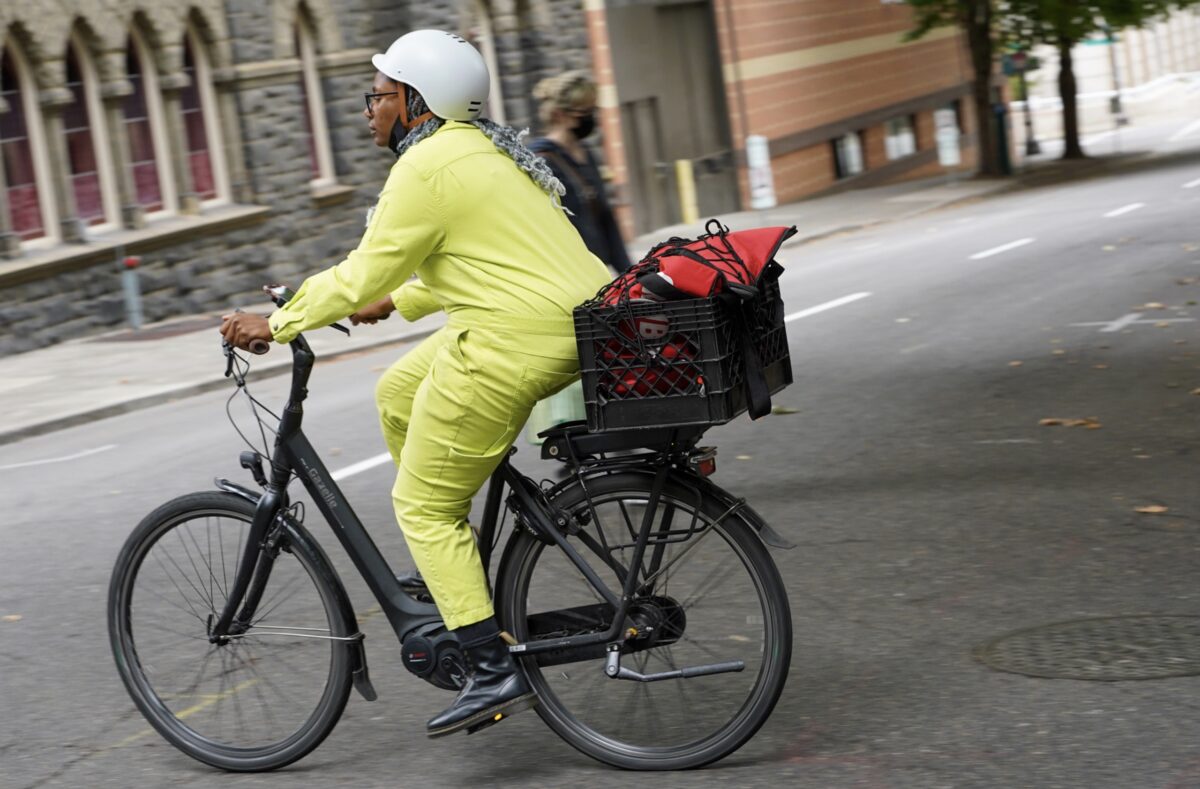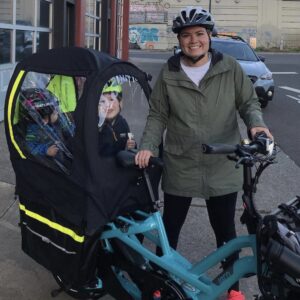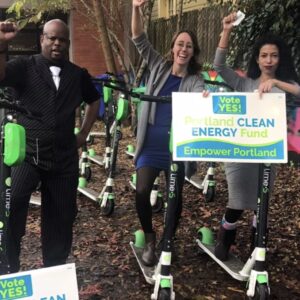
The second round of potential grantees for the Portland Clean Energy Fund have been selected and there’s good news for everyone who cares about reducing our use of cars and getting more people on bikes.
All four of the recommended winners in the Innovation Grant category — a total of $7.6 million — have a bike component to their project. The nonprofits that would carry out the work include Community Cycling Center, Forth, Bikes for Humanity PDX, and Metropolitan Family Services.
Those are four of 66 grants totaling nearly $111 million that the PCEF committee has recommended for funding in a list that will be heard at Portland City Council July 13th. It’s also a welcome change from the first tranche of PCEF funding in April 2021 that we singled out because it lacked transportation-related grants.
All told, the estimated GHG emission reductions over the life of the projects recommended this time around is 300,000 metric tons, equivalent to about 65,000 gas-powered cars driven for one year.
The stated aim of PCEF is to fund planning and implementation of projects and programs that will combat climate change through a lens of racial and social justice and it’s notable as the first initiative of its kind in Oregon that put people of color at the helm to design the program and decide what gets funded.
“We are really excited about this as an opportunity to demonstrate the power of e-bikes as practical, reliable, clean and affordable everyday transportation for people who need it the most.”
– Jeff Allen, Forth
The Community Cycling Center hopes their project will encourage people of color to bike more and drive less. They are poised to receive $499,419 over three years for a project that will help fund a program that will give away 900 bikes and, “fund 14,000 hours of staff time and provide stipends and logistical support to Black and Latinx community leaders so they can engage in transportation-related system improvement discussions,” says PCEF. “The project goals are to get more people on bikes and out of cars, keep bikes safe and functional, and support the community to advocate for smart intrastate and climate policy improvements.”
CCC Executive Director Momoko Saunders told me today they’ll use the stipends to pay members of partner groups like Andando en Bicicletas y Caminando (Riding your Bike and Walking Around). “The stipends are meant to help incentivise members and also cover any additional expenses they might have to incur while attending meeting/advocacy activities such as child care or transportation,” Saunders said.
The funding will also allow the CCC to expand its bike education efforts in low-income, BIPOC areas — particularly among young people (via summer camps) who’ve been severely impacted by school changes due to the pandemic.
Electric vehicle advocacy group Forth is lined up for a grant award of about $3.8 million over three years. In addition to installing solar panels at the Bybee Lakes Hope Center (a homeless services program), the funding will be used to purchase 30 electric bikes.
The e-bikes will be available for residents through a lending library. Forth Executive Director Jeff Allen says the location of the Bybee Lakes facility on N Marine Drive is .75 miles from the nearest TriMet stop where bus comes just four times a day and there’s no service on weekends or holidays. “The e-bikes will help them to get transit, to social services, to job interviews, and anywhere else they need to go,” he said in an email to BikePortland today. “We are really excited about this as an opportunity to demonstrate the power of e-bikes as practical, reliable, clean and affordable everyday transportation for people who need it the most.”
People experiencing homelessness (and others) will benefit from a $20,000 grant recommended for Bikes For Humanity PDX. Their project would provide 100 refurbished bikes and new u-locks to people in need through partner organizations that service youths in foster care, people recovering from addiction, and other Portlanders who have a hard time buying a bike themselves.
And the last bike-related project recommended by the PCEF committee would direct $3.5 million over five years to Metropolitan Family Services and would include stronger incentives for their clients to purchase e-bikes (just one part of their existing auto loan program).
Three projects not recommended for funding include: $3 million over three years to a group called Portland E-Bike Coalition that wants to give 1,600 Portlanders a free e-bike with a $100 annual fee that would supply them with maintenance and gear to keep them riding; $339,000 for a walking school bus program by Oregon Walks; and an $85,000 grant for The Street Trust to continue their #OurStreets organizing campaign.
The PCEF program is funded via a surcharge on large corporations and was approved by 65% of voters in 2018. City Council will have a first reading of PCEF’s recommended grantees on July 13th. Learn more, submit a comment, and see the full list of recommendations here.







Thanks for reading.
BikePortland has served this community with independent community journalism since 2005. We rely on subscriptions from readers like you to survive. Your financial support is vital in keeping this valuable resource alive and well.
Please subscribe today to strengthen and expand our work.
Peanuts for the elephant?
THANK YOU Clean Energy Fund. Last year I was disappointed at the lack of bikes winning successful grants, but seeing how all the bike groups rearranged their applications and organizations around POC shows strength in the program set up to align climate change goals with equity.
There’s a difference between saying you support equity and in fact realigning your entire organization structure to walk the talk. HINT: It’s more then a bullet point in your values statement.
E-bikes for Wapato residents, that’s brilliant. 60 bikes for CCC POC. Heck yeah. Paying mujeres to become more involved in transport decisions? Heck yeah. Can’t wait for the shake up they will make.
OPAL has been providing food and childcare for organizing meetings and it helped, but actual stipends means quality involvement by people who care about and ride bikes. They had the best catered tacos. Who doesn’t love tacos?
HINT: Everybody add food and childcare for organizing meetings. Only serve local hand made food cart tortilla tacos. ( but that just my personal preference. 🙂
Sorry but $5 million to bike-related non-profits is nothing to be excited about. This program has enough money to enact real change ($111 million). This money could construct miles of dedicated use paths or add bike parking to transit stops or commit money to planning for car-free transportation projects or, ad nauseum, ad infinitum. Instead they are giving $5 million to Street Roots for their new HQ which will fight climate change by… adding more office SF to the grid? It’s a non-profit industrial complex giveaway bonanza. Disgraceful.
Who exactly “ needs it the most”? When you’re talking about giving e-bikes out to less than 1% of even the just the poverty stricken people how does this do anything measurable to cut emissions? And wot exactly is this “study” studying? Wouldn’t it make larger impact to give out exponentially more analog/people powered bikes considering the respective costs?
What happens to the study when an individuals bike is stolen? Is insurance a thing.